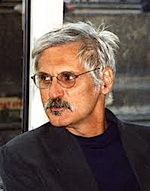Tuesday, January 18, 2011
By JENNIFER HOWARD [Chronicle of Higher Education] – [Timothy J.] Johnson has charge of what he describes as the world’s largest collection of material related to Holmes and his creator, Sir Arthur Conan Doyle. The archive includes the 1887 Beeton’s Christmas Annual, which contained the first Holmes story to appear in print (“A Study in Scarlet”); 31 copies still exist worldwide, and Minnesota holds four of them. The collection also features many letters from Doyle to various correspondents as well as original artwork and sketches done by Frederic Dorr Steele, who illustrated Holmes stories for Collier’s Weekly. And it contains the correspondence of John Bennett Shaw, a collector of Sherlockiana with close ties to the organization of Holmes enthusiasts known as the Baker Street Irregulars.
Continue reading “The Case of the Norwegian Explorers of Minnesota.” »
[via Poetry Archive] – Sunday 23 January at 7pm. Royal Festival Hall, South Bank Centre SE1. Introduced by Ian McMillan, poet and presenter of BBC Radio 3’s The Verb, the TS Eliot Prize Readings showcase the best poetry of the year as legendary names and rising stars rub shoulders for this prestigious award for the best poetry collection of 2010. Simon Armitage, Annie Freud, John Haynes, Seamus Heaney, Pascale Petit, Robin Robertson, Fiona Sampson, Brian Turner, Derek Walcott and Sam Willetts are the shortlisted poets for this year’s prize. Continue reading “Event: The TS Eliot Prize Readings, London.” »
Saturday, January 15, 2011

Alberto Rollo: A few questions about e-books.
By REBECCA CARTER [Words Without Borders ] – As the digital revolution reconfigures the publishing industry, the role of editor will come under increasing scrutiny. What is a publishing house? Is it a machine for production, distribution and sales, or is it a nurturer of talent? For a long time now, publishers have aimed to keep all these attributes under one roof, but the task is becoming increasingly difficult. The “demise of the editor” has been a frequent lament in Britain and America over the past twenty years as the economic imperatives of large-scale publishing necessitate the prioritization of marketing over the costly, time-consuming process of working on texts to make them as good as they can be. The massive increase in the number of literary agents has been, in part, a response to the failure of publishers to give authors enough editorial time, itself in part a catalyst in the breakdown of close author-editor relationships. The editor’s role is threatened still further by the difficulty of generating income from e-books. When authors argue that their e-book royalties should be higher because productions costs are lower, they open a can of worms about overheads, because of course producing a text doesn’t just involve the cost of printing, paper, and postage: in the large organizations, where overheads are extremely high, those responsible for efficiency savings may well start to think that the often-invisible work done by editors is something that can be cut. Continue reading “Ebooks: editing ‘editor’ out of the budget.” »
By EUGENE G. SCHWARTZ [ForeWord] – We thought then that marketing resided in editorial, which is why it took so long for publishers to actually create the marketing function and extract it from editorial. It has been and continues to be the instinct of the editor and the author that positions the theme, the message and the execution in a place where the reader finds a home.
The new editorial mission in the digital and multi-media age will not change – but the technologies of expression — and how reading is experienced — require skill-sets that may silence – and have silenced — some writers and editors before their time (as with designers who didn’t make the leap to desktop thirty years ago) – but I doubt its permanence. The expressive and editorial urge is too strong and word-smithery still remains at the heart and gateway to communications in all media.
Continue reading “The future of ‘word-based narrative skills in portable multi-media devices.’” »
Thursday, January 13, 2011
By THEODORE DALRYMPLE [Axess] – The great English moralist of the Eighteenth Century, Dr Johnson, once said that public affairs vex no man.
So it is not astonishing, either, that so many of us in Europe continue our lives without noticing, let alone thinking about, the seismic shifts in world power that have occurred in the last two or three decades. In part this is because we have already lived with a seismic shift without really noticing it: the transformation of Europe from forefront to backwater. We in Europe are at the front end of nothing, except perhaps taking holidays. Not that I am against holidays: in fact, speaking personally, I rather prefer them to exercising power.
Continue reading “The alchemy of indolence: ‘the transformation of Europe from forefront to backwater’.” »
Wednesday, January 12, 2011
By BRIAN EARLS [Dublin Review of Books] – There can come a moment in the experience of travel when a shift in understanding occurs – that instant when, as it were, the curtains begin to part – as a previously elusive society seems to reveal something essential about itself.
I experienced one such moment on a summer evening in the early 1990s. Together with a Moscow friend, I had gone on a walking holiday and found myself spending the night in a mountain hut in the southern Russian republic of Kabardino Balkaria. Apart from myself, the remainder of the company, a group of about six climbers, were Russians. I had at that time been living in Moscow for about a year, and was slowly and with an effort that was scarcely matched by the meagre results, making my way into the beguiling but unyielding Russian language. I and my companion were mere hill walkers, but the others in the hut were serious climbers, who the following day planned to climb the nearby Mount Elberus. As this involved setting out before sunrise, and thus before the summer heat had begun to melt the snow, the climbers were not inclined to sleep. Instead they passed the time exchanging what they called anekdoty. Continue reading “Did you hear the anekdoty about the Irish hiker who finally got the Russian joke?” »
Wednesday, January 12, 2011
[IWP/Brown University] – International Writers Project Fellowship Brown University seeks applications and nominations for the 2011-2012 International Writers Project Fellowship. The Fellowship provides institutional, intellectual and artistic support to writers who face personal danger, oppression, and/or threats to their livelihood in nations throughout the world. Continue reading “Fellowship: International Writers Project at Brown.” »
Tuesday, January 11, 2011
By MICHAEL BÉRUBÉ [Democracy] – What, you ask, was the Sokal Hoax? While I was chatting with my colleagues at the Postmodern Science Forum, New York University physicist Alan Sokal, having read Higher Superstition, decided to try an experiment. He painstakingly composed an essay full of (a) flattering references to science-studies scholars such as Ross and Stanley Aronowitz, (b) howler-quality demonstrations of scientific illiteracy, (c) flattering citations of other science-studies scholars who themselves had demonstrated howler-quality scientific illiteracy, (d) questionable-to-insane propositions about the nature of the physical world, (e) snippets of fashionable theoretical jargon from various humanities disciplines, and (f) a bunch of stuff from Bohr and Heisenberg, drawing object lessons from the uncertainty at the heart of quantum mechanics. Continue reading “Alan Sokal and the advanced science of foot-shooting.” »
 By ERIC ORMSBY [from Fine Incisions: Essays on Poetry and Place] – Whether writing on Tennyson, Eliot, Housman, Beckett, or many others, Christopher Ricks has always been a critic of exceptional learning and aplomb; that he has been generally given to a somewhat oblique, even eccentric angle of view — embarrassment in Keats, the subtleties of punctuation in Geoffrey Hill — has been to his credit, for while he is in one sense a traditional textual expert of rare authority (witness his editions of Tennyson and T. S. Eliot’s smuttier verses), he has also exhibited a delightful ability to surprise. His new book is no exception, less so in its erudition perhaps than in its surprises. Ricks, who recently completed a five-year term as the Oxford Professor of Poetry, has always been smitten with Bob Dylan; even in The Force of Poetry, his 1984 collection of essays, he included considerations of the singer as a poet rather than as a popular performer. It is clear now that his infatuation with the singer — the word is not too strong — has been no passing fancy but constitutes an all-consuming passion. With his new book, Ricks reminds us, on virtually every page, that the word ‘fan’ derives from ‘fanatic.’
By ERIC ORMSBY [from Fine Incisions: Essays on Poetry and Place] – Whether writing on Tennyson, Eliot, Housman, Beckett, or many others, Christopher Ricks has always been a critic of exceptional learning and aplomb; that he has been generally given to a somewhat oblique, even eccentric angle of view — embarrassment in Keats, the subtleties of punctuation in Geoffrey Hill — has been to his credit, for while he is in one sense a traditional textual expert of rare authority (witness his editions of Tennyson and T. S. Eliot’s smuttier verses), he has also exhibited a delightful ability to surprise. His new book is no exception, less so in its erudition perhaps than in its surprises. Ricks, who recently completed a five-year term as the Oxford Professor of Poetry, has always been smitten with Bob Dylan; even in The Force of Poetry, his 1984 collection of essays, he included considerations of the singer as a poet rather than as a popular performer. It is clear now that his infatuation with the singer — the word is not too strong — has been no passing fancy but constitutes an all-consuming passion. With his new book, Ricks reminds us, on virtually every page, that the word ‘fan’ derives from ‘fanatic.’
Continue reading “Excerpt: (Eric) Ormsby on (Christopher) Ricks on (Bob) Dylan.” »
Saturday, January 8, 2011

[From How to be a Retronaut] – The East Side Public Library, Detroit, Michigan. Continue reading “An American city in ruins.” »
Thursday, January 6, 2011
By ANTHONY GARDNER [Intelligent Life] – Mothers and fathers used to bring up children: now they parent. Critics used to review plays: now they critique them. Athletes podium, executives flipchart, and almost everybody Googles. Watch out—you’ve been verbed.
The English language is in a constant state of flux. New words are formed and old ones fall into disuse. But no trend has been more obtrusive in recent years than the changing of nouns into verbs. “Trend” itself (now used as a verb meaning “change or develop in a general direction”, as in “unemployment has been trending upwards”) is further evidence of—sorry, evidences—this phenomenon.
Continue reading “Nonsensing ourselves into oververbed oblivion.” »
Wednesday, January 5, 2011
 By ANGE MLINKO [The Nation] – “Text,” the Oxford English Dictionary tells us, came into English usage as a signifier for the Gospels. It is related to texture and textile, establishing the written and the woven as related pursuits that join the useful and the comely. Thus wrote the fourteenth-century poet William Langland in Piers Plowman: “Dilige deum & proximum tuum, &c. [Th]is was [th]e tixte trewly..; [the] glose was gloriousely writen.”
By ANGE MLINKO [The Nation] – “Text,” the Oxford English Dictionary tells us, came into English usage as a signifier for the Gospels. It is related to texture and textile, establishing the written and the woven as related pursuits that join the useful and the comely. Thus wrote the fourteenth-century poet William Langland in Piers Plowman: “Dilige deum & proximum tuum, &c. [Th]is was [th]e tixte trewly..; [the] glose was gloriousely writen.”
The “gloriousely writen” text doesn’t seem to be the bailiwick of linguists. If there’s an offense that unites scientists and post-structuralists against a common foe, it’s belle-lettrism. Yet the concern with text as texture–what we’ve come to call its style–is fundamental not only to the pleasure of reading but to the understanding of what is written, which at its best is a fabric: composed of many strands. Discerning those strands requires knowledge–and judgment. Style is an apotheosis: it is the revelation of any author’s “construction of reality.” Continue reading “400 years of swearing on King James’ ‘gloriouse’ text.” »
Wednesday, January 5, 2011
By HARVEY C. MANSFIELD [Claremont Review of Books] – Nowadays it is conservatives rather than liberals who stand up for liberty. Liberals have given themselves over to the advance of democracy, knowing not where it leads, and caring little for what might happen to liberty along the way of progress. Kenneth Minogue, professor emeritus of political science at the London School of Economics, stands up for liberty but refrains from adopting the conservative cause, preferring to pick and choose rather than to join up. He makes his own points, sets his own example, and saves himself the trouble of defending or correcting embarrassing companions in the struggle. He is nonetheless the author of a conservative classic, The Liberal Mind (1963), which as the title of his latest book, having abandoned irony and referring to the same thing, he now calls The Servile Mind.
Continue reading “Kenneth Minogue: More democracy than the people want?” »
By ANDRÉ GLUCKSMANN [City Journal] – Over the centuries, there have appeared two great conceptions of freedom. The first vision, which one can call “epic freedom,” is freedom as Hegel or Marx understood it, the freedom of messianists and of revolutionaries. The meaning of freedom, on this view, is the progressive emancipation of man: step by step, battle by battle, mankind is supposed to break with its alienations and become the creator and absolute master of its fate. Epic freedom is the assumption of a cosmic mastery, more and more aware of itself. Crises become mere historical stages on the way to the final achievement of human emancipation.
Continue reading “Athens’ tragic freedom.” »
























